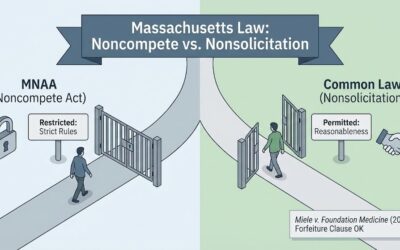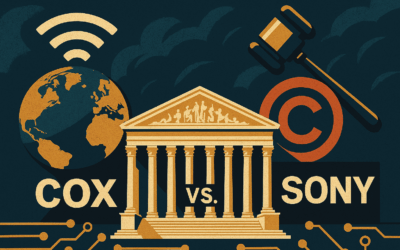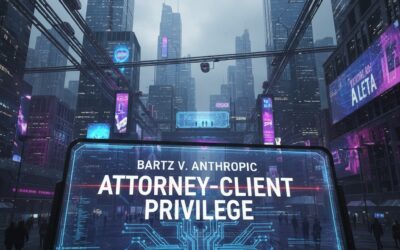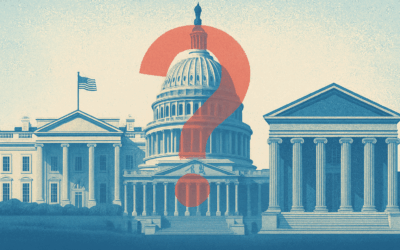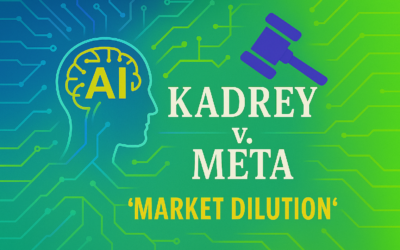Mass Law Blog
Intellectual property and business litigation, Massachusetts and nationallyWritten by humans
Lee Gesmer’s Mass Law Blog began in 2005, and contains almost 600 posts. The site initially focused on Massachusetts law, but today it follows business and intellectual property law nation-wide. The site is hosted by Gesmer Updegrove LLP, a law firm based in Boston, Massachusetts. The firm represents startup and established companies in the areas of litigation, transactions (including financings, mergers and acquisitions), IP rights, taxation, employment law, standards consortia, business counseling and open source development projects and foundations. You can find a summary of the firm’s services here. To learn how Gesmer Updegrove can help you, contact: Lee Gesmer
The Massachusetts Noncompetition Agreement Act and Nonsolicitation Agreements: Miele v. Foundation Medicine
When the Massachusetts Noncompetition Agreement Act (MNAA) took effect in October 2018, I described the law in detail and wrote that employers and employees were entering “a new era” in noncompete law. The statute imposed formalities, created new employee protections, and limited the enforceable duration of noncompetes. But it also drew a set of carefully worded exclusions - most notably for nonsolicitation agreements. I predicted that those exclusions would become critical as employers...
Sony v. Cox Heads to the Supreme Court
Can your internet provider be held liable for what you download? That's the question the Supreme Court will wrestle with on December 1, when it hears Sony Music Entertainment v. Cox Communications - a case that could reshape how the internet handles copyright enforcement. Back in May 2024 I wrote about the Fourth Circuit's February 2024 decision in this case, breaking down the court's divergent rulings on vicarious and contributory liability. Now the stakes have gotten even higher. The Supreme...
The Celestial Jukebox: Copyright Law and the Business of Music
“The absolute transformation of everything that we ever thought about music will take place within 10 years, and nothing is going to be able to stop it. I see absolutely no point in pretending that it's not going to happen. I'm fully confident that copyright, for instance, will no longer exist in 10 years.” - David Bowie, 2002 In 1994, Stanford copyright scholar Paul Goldstein coined a phrase that captured the imagination of anyone following the collision between music and technology. He...
Did Anthropic Waive Attorney-Client Privilege?
Update: the same day I posted this article Bartz and Anthropic announced that they had settled the case. The terms are as yet unknown, and the settlement will need to be approved by the judge. However, this topic is not moot - it could easily arise in one of the many genAI copyright cases still pending. The eyes of the artificial intelligence community are laser-focused on the upcoming class action damages trial in Bartz v. Anthropic, scheduled for December 1, 2025. This will be the first...
Fair Use or Theft? The Copyright War Behind Generative AI
The United States is in a race to achieve global dominance in artificial intelligence (AI). Whoever has the largest AI ecosystem will set global AI standards and reap broad economic and military benefits. Just like we won the space race, it is imperative that the United States and its allies win this race. . . . Build, Baby, Build. America's AI Action Plan, July 2025 The explosion of generative AI has triggered a legal crisis that few saw coming and nobody seems equipped to fix. At the center...
Kadrey v. Meta: Will Market Dilution Reshape AI Copyright Law?
The recent blockbuster decisions in Bartz v. Anthropic and Kadrey v. Meta have raised a number of important and controversial issues. On the facts, both cases held that using copyright-protected works to train large language models was fair use. Still, AI industry executives shouldn’t be too quick to celebrate. Bartz held that Anthropic is liable for creating a library of millions of works downloaded illegally from "shadow libraries," and it could be facing hundreds of millions of dollars in...

